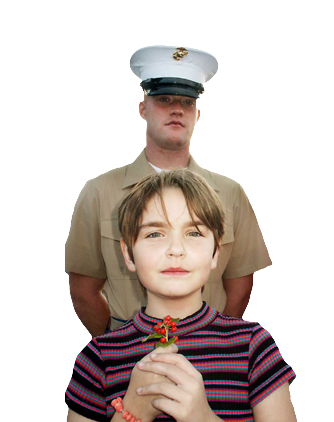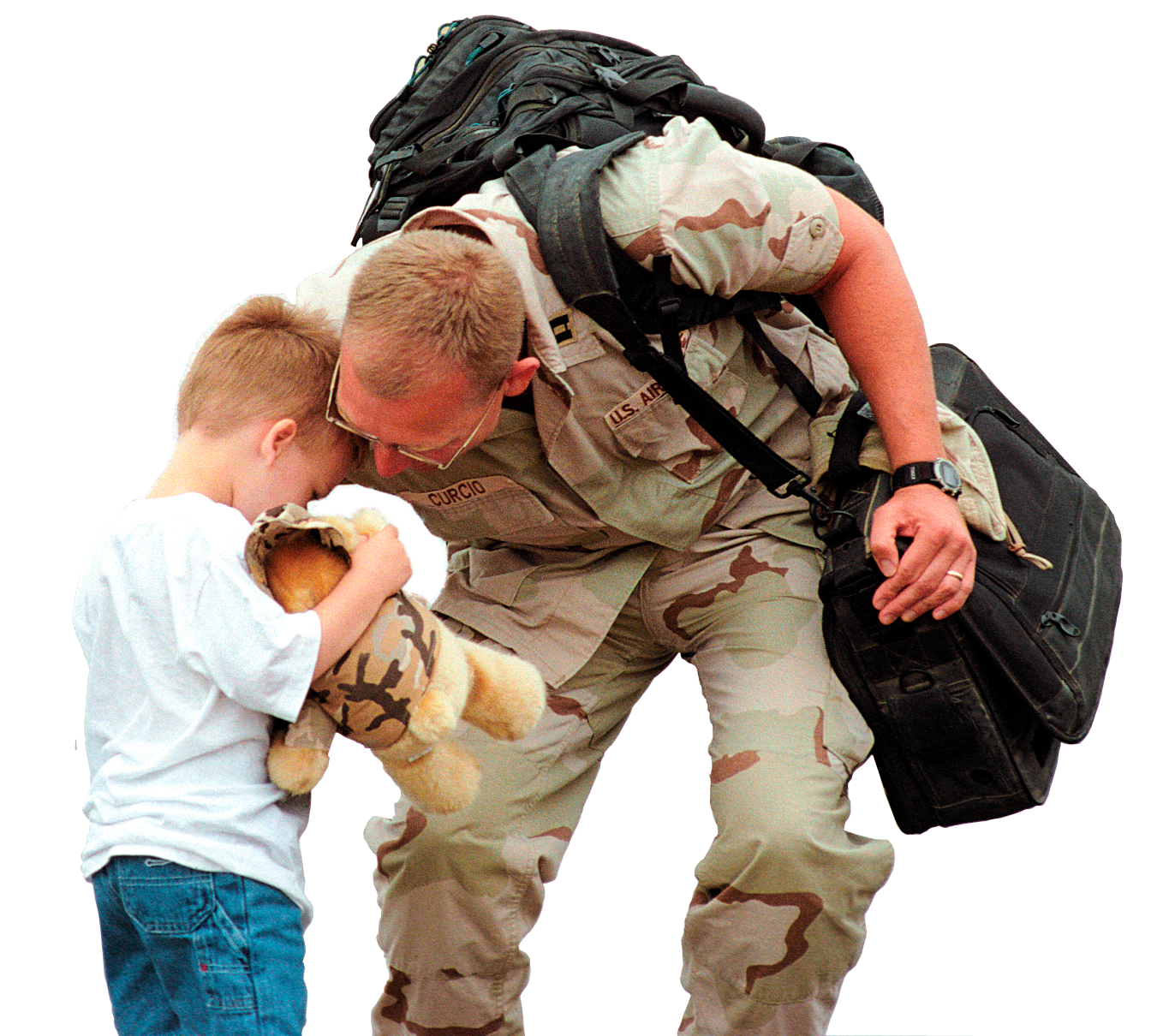Meet Your Military
- Details
- Hits: 2057
 PHOTO: Air Force Senior Airman David Flaten trains at Rosaryville State Park, Md., June 3, 2014. U.S. Air Force photo by Senior Airman Nesha HumesJOINT BASE ANDREWS, Md. – It was summer 2007 in Wausau, Wisconsin. David Flaten, now a senior airman assigned here, had completed his first mountain bike race through the 9-mile forest course with no racing experience and only a simple knowledge of cycling. But after regaining the feeling in his legs, he said, he knew he had fallen in love. Flaten is ranked 43rd of 250 cross-country mountain bicyclists by USA Cycling, the official cycling organization responsible for identifying, training and selecting cyclists to represent the United States in international competition. In January 2013, just three years after enlisting and with eight years of experience cycling, Flaten started racing professionally. "I apply a lot of my military bearing in my training and racing. It's important to treat every competitor with respect," he said. "I take pride in taking care of my bike and equipment, just as I take pride in wearing the uniform."
PHOTO: Air Force Senior Airman David Flaten trains at Rosaryville State Park, Md., June 3, 2014. U.S. Air Force photo by Senior Airman Nesha HumesJOINT BASE ANDREWS, Md. – It was summer 2007 in Wausau, Wisconsin. David Flaten, now a senior airman assigned here, had completed his first mountain bike race through the 9-mile forest course with no racing experience and only a simple knowledge of cycling. But after regaining the feeling in his legs, he said, he knew he had fallen in love. Flaten is ranked 43rd of 250 cross-country mountain bicyclists by USA Cycling, the official cycling organization responsible for identifying, training and selecting cyclists to represent the United States in international competition. In January 2013, just three years after enlisting and with eight years of experience cycling, Flaten started racing professionally. "I apply a lot of my military bearing in my training and racing. It's important to treat every competitor with respect," he said. "I take pride in taking care of my bike and equipment, just as I take pride in wearing the uniform."
Flaten is ranked 43rd on a list of 250 for cross-country mountain bikers, according to USA cycling, the official cycling organization responsible for identifying, training and selecting cyclists to represent the United States in international competition. He participated in the 2013 Conseil International du Sport Militaire cycling competition in Belgium as one of two active-duty cycling professionals for the Armed Forces Cycling Team. To be selected for that elite group, a cyclist must be rated as a professional mountain biker or as a Category 1 road cyclist. Flaten said he is most proud of his continuous self-motivation and added that he is "always pedaling in a forward direction." The 21-year-old's training includes core exercises, stretching and high-intensity cycling on roadways and through mountain terrain. He works out at least 20 hours a week. Clean eating, staying hydrated and resting are a 24/7 discipline, he said. "The drive you have to force yourself to [train] is more important than being able to physically turn over the pedals," he said.
Read more: Meet Your Military: Airman Brings Military Discipline to Cycling
- Details
- Hits: 1724
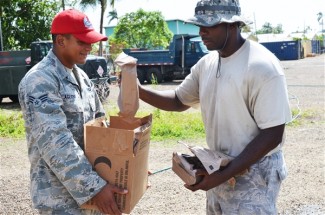 PHOTO: Air Force Senior Airman Mario Acevedo, left, issues packaged meals to Air Force Staff Sgt. Smette Pompfiliusin in Ladyville, Belize, during the U.S. Southern Command-sponsored New Horizons training exercise, June 24, 2014. U.S. Air Force photo by Master Sgt. Kelly Ogden LADYVILLE, Belize – Air Force Senior Airman Mario Acevedo is one of the busiest airmen assigned to the U.S. Southern Command-sponsored New Horizons exercise in Belize. As the lodging representative, he makes room assignments, tracks personnel accountability and works with the host nation hotel to make sure things such as laundry, dining and housekeeping practices are meeting government standards. Acevedo, a services journeyman deployed here from the 820th RED HORSE Squadron, Nellis Air Force Base, Nevada, also plans morale trips, barbeques, movie nights and sports and fitness activities. He also issues packaged meals to more than 560 personnel, delivers breakfast to two engineering constructions sites in Belize City each morning and assists with switching out Belizean security guards at the end and beginning of their shifts. “I’ve enjoyed it,” said Acevedo, who hails from Tucson, Arizona.
PHOTO: Air Force Senior Airman Mario Acevedo, left, issues packaged meals to Air Force Staff Sgt. Smette Pompfiliusin in Ladyville, Belize, during the U.S. Southern Command-sponsored New Horizons training exercise, June 24, 2014. U.S. Air Force photo by Master Sgt. Kelly Ogden LADYVILLE, Belize – Air Force Senior Airman Mario Acevedo is one of the busiest airmen assigned to the U.S. Southern Command-sponsored New Horizons exercise in Belize. As the lodging representative, he makes room assignments, tracks personnel accountability and works with the host nation hotel to make sure things such as laundry, dining and housekeeping practices are meeting government standards. Acevedo, a services journeyman deployed here from the 820th RED HORSE Squadron, Nellis Air Force Base, Nevada, also plans morale trips, barbeques, movie nights and sports and fitness activities. He also issues packaged meals to more than 560 personnel, delivers breakfast to two engineering constructions sites in Belize City each morning and assists with switching out Belizean security guards at the end and beginning of their shifts. “I’ve enjoyed it,” said Acevedo, who hails from Tucson, Arizona.
“The best part of the deployment is working with a great team.” Acevedo joined the Air Force four years ago. His great-grandfather and his grandfather served in the Navy, and his father served in the Army. “It was kind of a ‘keep it in the family’ thing,” Acevedo said. “I wanted to do something that was noteworthy, and I had an urge to serve my country.” The airman said that although his father is very proud of him and likes that he is serving, his mother is just “OK” with his military service, and wants her son to be careful and safe. But he plans to serve for 30 years if he can, he added, and to retire from the Air Force as a chief master sergeant. “You have to aim high and have goals,” he said. In just a few weeks, the New Horizons exercise will be complete and Acevedo will return home. Although he is excited to redeploy, he said, he will miss the Belizean people. “Just talking to them was great,” he said. “They made it kind of feel like home.”
Written June 25, 2014 By: Air Force Master Sgt. Kelly Ogden 12th Air Force Republished and redistributed by permission of DoD.
- Details
- Hits: 2328
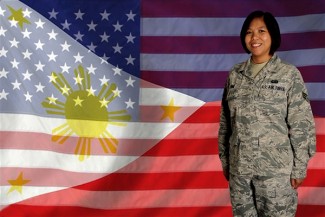 PHOTO: Air Force Senior Airman LadyCiara Eime, born and raised in the Philippines, speaks six languages: Cebuano, Tagalog, Chavacano, Mandarin, English and Nihongo. U.S. Air Force graphic by Senior Airman Melanie Bulow-GontermanTAMPA, Fla. – University of Alaska Anchorage Chancellor Edward Lee Gorsuch once said, “Learning a foreign language not only reveals how other societies think and feel, what they have experienced and value, and how they express themselves, it also provides a cultural mirror in which we can more clearly see our own society.” For Air Force Senior Airman LadyCiara Eime, 6th Comptroller Squadron command support staff, learning languages has become second nature. Eime was born and raised in the Philippines, speaking Tagalog as the household language. Her parents, both from different cultural backgrounds, widened her vocabulary to Cebuano and Chavacano, the native tongues of her father, and Mandarin, her mother’s native language. While growing up, Eime said, she dreamed of coming to the United States and fulfilling the American dream, so she began to save her money. Her parents encouraged her to invest her money and time in education, she added, because once that was complete, the possibilities for their little girl were endless.
PHOTO: Air Force Senior Airman LadyCiara Eime, born and raised in the Philippines, speaks six languages: Cebuano, Tagalog, Chavacano, Mandarin, English and Nihongo. U.S. Air Force graphic by Senior Airman Melanie Bulow-GontermanTAMPA, Fla. – University of Alaska Anchorage Chancellor Edward Lee Gorsuch once said, “Learning a foreign language not only reveals how other societies think and feel, what they have experienced and value, and how they express themselves, it also provides a cultural mirror in which we can more clearly see our own society.” For Air Force Senior Airman LadyCiara Eime, 6th Comptroller Squadron command support staff, learning languages has become second nature. Eime was born and raised in the Philippines, speaking Tagalog as the household language. Her parents, both from different cultural backgrounds, widened her vocabulary to Cebuano and Chavacano, the native tongues of her father, and Mandarin, her mother’s native language. While growing up, Eime said, she dreamed of coming to the United States and fulfilling the American dream, so she began to save her money. Her parents encouraged her to invest her money and time in education, she added, because once that was complete, the possibilities for their little girl were endless.
“I always wanted to learn about different cultures, and I love to travel,” she said, noting that her parents instilled in her that a higher education is the only wealth that cannot be stolen or taken away. “My parents always told me that people who know more about other cultures are knowledgeable and know their way around life,” she said. “Learning their language is the best weapon you can use to battle the challenges that life may bring you.” With the small amount of money she saved and with help from the Philippine president and an American telecommunications company, Eime earned a bachelor’s degree in international business administration and graduated with honors.
Read more: Meet Your Military: Airman Finds Success Speaking 6 Languages
- Details
- Hits: 2171
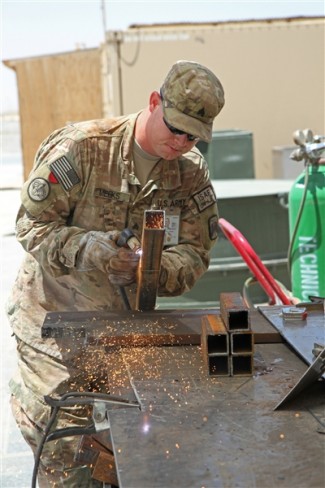 PHOTO: Army Sgt. Marshall R. Meeks prepares pieces he will use to make a cart to transport heavy equipment at Kandahar Airfield, Afghanistan, June 7, 2014. U.S. Army photo by Staff Sgt. Bryan Lewis KANDAHAR AIRFIELD, Afghanistan – An allied trade specialist with Task Force Bellator here uses his creativity not only to enhance his unit’s mission effectiveness, but also to raise his morale. Army Sgt. Marshall R. Meeks enlisted as a metal worker in 2006. As the Army transitioned, his military occupational specialty was combined with the machinist specialty to produce more versatile soldiers. Meeks, a San Antonio native, said he enlisted as a way to expand on abilities he had developed in his civilian life. “I used to be a mechanic, [used to] build houses, and was a freelance contractor,” he said. “I joined the Army to be a welder.” Now serving on his third deployment, Meeks transitioned from supporting ground units most of his career to supporting aviation with the 16th Combat Aviation Brigade.
PHOTO: Army Sgt. Marshall R. Meeks prepares pieces he will use to make a cart to transport heavy equipment at Kandahar Airfield, Afghanistan, June 7, 2014. U.S. Army photo by Staff Sgt. Bryan Lewis KANDAHAR AIRFIELD, Afghanistan – An allied trade specialist with Task Force Bellator here uses his creativity not only to enhance his unit’s mission effectiveness, but also to raise his morale. Army Sgt. Marshall R. Meeks enlisted as a metal worker in 2006. As the Army transitioned, his military occupational specialty was combined with the machinist specialty to produce more versatile soldiers. Meeks, a San Antonio native, said he enlisted as a way to expand on abilities he had developed in his civilian life. “I used to be a mechanic, [used to] build houses, and was a freelance contractor,” he said. “I joined the Army to be a welder.” Now serving on his third deployment, Meeks transitioned from supporting ground units most of his career to supporting aviation with the 16th Combat Aviation Brigade.
His ability to weld, mold and create products from scratch makes him a highly sought commodity among the unit’s logisticians, mechanics, crew chiefs, pilots and senior leaders. “Being in a welding shop is a real spotlight,” he said. “A lot of people get you to build a lot of different stuff. They will give me a blueprint with tolerances. … As long as you make it to that print, then you are good to go.” Meeks assisted soldiers in his support battalion by building a cart to carry Hellfire missiles and their cases, which weigh almost 250 pounds each. Moving each case used to require four soldiers carrying it, but now the task requires just one soldier rolling a cart. Meeks said that on a previous deployment, he was shown a picture of a missile cart, but it carried only the missile and not the case.
Read more: Meet Your Military: Soldier's Creativity Benefits Mission, Morale
- Details
- Hits: 1676
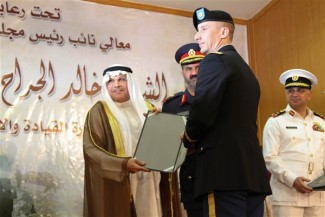 PHOTO: U.S. Army Maj. Robert Bonham receives his master's degree in military science from Kuwaiti Deputy Prime Minister Sheikh Salem Abdulaziz Al-Sabah after completing the advance staff college course at the Mubarak Al-Abdullah Joint Command and Staff College in Kuwait City, June 17, 2014. U.S. Army photo by Sgt. Tracy R. Myers KUWAIT CITY – Among a crowd of foreign military personnel wearing a multitude of different hats and uniforms, one U.S. Army officer, Maj. Robert Bonham, graduated from the Mubarak Al-Abdullah Joint Command and Staff College here yesterday. Bonham, a native of Shalersville, Ohio, participated in the U.S. Army’s Schools of Other Nations program to further his career. As a graduate of the Mubarak Al-Abdullah Joint Command and Staff College, he has earned a master’s degree in military science.
PHOTO: U.S. Army Maj. Robert Bonham receives his master's degree in military science from Kuwaiti Deputy Prime Minister Sheikh Salem Abdulaziz Al-Sabah after completing the advance staff college course at the Mubarak Al-Abdullah Joint Command and Staff College in Kuwait City, June 17, 2014. U.S. Army photo by Sgt. Tracy R. Myers KUWAIT CITY – Among a crowd of foreign military personnel wearing a multitude of different hats and uniforms, one U.S. Army officer, Maj. Robert Bonham, graduated from the Mubarak Al-Abdullah Joint Command and Staff College here yesterday. Bonham, a native of Shalersville, Ohio, participated in the U.S. Army’s Schools of Other Nations program to further his career. As a graduate of the Mubarak Al-Abdullah Joint Command and Staff College, he has earned a master’s degree in military science.
The Schools of Other Nations program aims to develop closer relationships between the U.S. and foreign armies. Bonham said he is grateful for the knowledge and kinship he took away from his educational experience. “Having the chance to attend the Kuwait army staff college through the Schools of Other Nations [program] was a rewarding experience personally and professionally,” he said. “I’ve developed lasting relationships with officers from across the globe. I have learned a great deal about how their militaries function and integrate nationally as members of the Gulf Cooperation Council and International Coalition.” The Gulf Cooperation Council, a political and economic alliance of six Middle Eastern countries -- Saudi Arabia, Kuwait, the United Arab Emirates, Qatar, Bahrain and Oman -- was established in 1981 to achieve unity among its members based on their common objectives and their similar political and cultural identities. “The most unique facet of the course was the joint, multinational aspect,” Bonham said. “The majority of students were Kuwait officers from the Kuwait armed forces and Ministry of Interior, while the remaining students were from all military branches of Pakistan, Turkey, Bangladesh, United Kingdom, Canada, Australia, Jordan, Lebanon, Sudan and GCC countries.” The 10-month graduate-level course trains field-grade officers to perform as a member of a joint, multinational headquarters. U.S. Army majors are required to complete intermediate level education as part of their professional military education, Bonham noted.
Read more: Meet Your Military: U.S. Major Graduates From Kuwaiti Course




